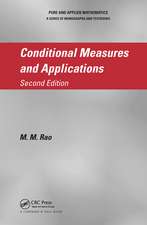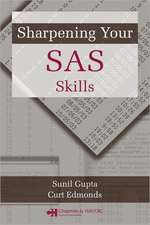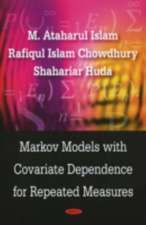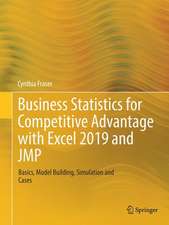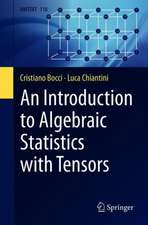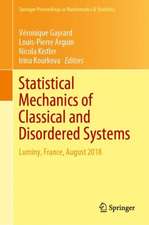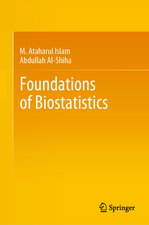Analysis of Repeated Measures Data
Autor M. Ataharul Islam, Rafiqul I Chowdhuryen Limba Engleză Hardback – 18 iul 2017
The book systematically addresses key problems arising in the modelling of repeated measures data, bearing in mind those factors that play a major role in estimating the underlying relationships between covariates and outcome variables for correlated outcome data. In addition, it presents new approaches to addressing current challenges in the field of repeated measures and models based on conditional and joint probabilities. Markov models of first and higher orders are used for conditional models in addition to conditional probabilities as a function of covariates. Similarly, joint models are developed using both marginal-conditional probabilities as well as joint probabilities as a function of covariates.
In addition to generalized linear models for bivariate outcomes, it highlights extended semi-parametric models for continuous failure time data and their applications in order to include models for a broader range of outcome variables that researchers encounter in various fields. The book further discusses the problem of analysing repeated measures data for failure time in the competing risk framework, which is now taking on an increasingly important role in the field of survival analysis, reliability and actuarial science. Details on how to perform the analyses are included in each chapter and supplemented with newly developed R packages and functions along with SAS codes and macro/IML. It is a valuable resource for researchers, graduate students and other users of statistical techniques for analysing repeated measures data.
| Toate formatele și edițiile | Preț | Express |
|---|---|---|
| Paperback (1) | 486.42 lei 43-57 zile | |
| Springer Nature Singapore – 12 mai 2018 | 486.42 lei 43-57 zile | |
| Hardback (1) | 589.02 lei 43-57 zile | |
| Springer Nature Singapore – 18 iul 2017 | 589.02 lei 43-57 zile |
Preț: 589.02 lei
Preț vechi: 692.96 lei
-15% Nou
Puncte Express: 884
Preț estimativ în valută:
112.72€ • 117.25$ • 93.06£
112.72€ • 117.25$ • 93.06£
Carte tipărită la comandă
Livrare economică 14-28 aprilie
Preluare comenzi: 021 569.72.76
Specificații
ISBN-13: 9789811037931
ISBN-10: 9811037930
Pagini: 250
Ilustrații: XIX, 250 p. 6 illus.
Dimensiuni: 155 x 235 x 21 mm
Greutate: 0.56 kg
Ediția:1st ed. 2017
Editura: Springer Nature Singapore
Colecția Springer
Locul publicării:Singapore, Singapore
ISBN-10: 9811037930
Pagini: 250
Ilustrații: XIX, 250 p. 6 illus.
Dimensiuni: 155 x 235 x 21 mm
Greutate: 0.56 kg
Ediția:1st ed. 2017
Editura: Springer Nature Singapore
Colecția Springer
Locul publicării:Singapore, Singapore
Cuprins
Introduction.- Linear Models.- Univariate Exponential Family of Distributions.- Generalized Linear Model.- Covariate Dependent Markov Models.- Model for Bivariate Binary Data.- Model for Bivariate Geometric Model.- Model for Bivariate Count Data.- Models for Bivariate Exponential and Weibull Data.- Quasi –Likelihood Methods.- Generalized Estimating Equations.- A Generalized Multivariate Model.- Multistate and Multistage Models.- Analysing Data Using R and SAS.
Notă biografică
M. Ataharul Islam is currently a professor at the Department of Applied Statistics, East West University, Bangladesh. He was a formerly professor of statistics at the Universiti Sains Malaysia, King Saud University and the University of Dhaka. He served as a visiting faculty at the University of Hawaii and University of Pennsylvania. He is a recipient of the Pauline Stitt Award, Western North American Region (WNAR) Biometric Society Award for content and writing, University Grants Commission Award for book and research, and the Ibrahim Memorial Gold Medal for research. He has published more than 100 papers in international journals on various topics, mainly on longitudinal and repeated measures data including multistate and multistage hazards model, statistical modelling, Markov models with covariate dependence, generalized linear models, conditional and joint models for correlated outcomes. He authored a book on Markov models, edited one book jointly and contributed chapters in several books.
Rafiqul I. Chowdhury, a former senior lecturer at the Department of Health Information Administration, Kuwait University, Kuwait, has been involved widely in various research projects as a research collaborator and consultant. He has extensive experience in statistical computing with large data sets, specially, with repeated measures data. He has published more than 60 papers in international journals on statistical computing, repeated measures data and utilization of health care services among others and presented papers in various conferences. He co-authored a book on Markov models and wrote programs and developed packages for marginal, conditional and joint models including multistate Markov and hazards models, bivariate generalized linear models on Poisson, geometric, Bernoulli using SAS and R.
Rafiqul I. Chowdhury, a former senior lecturer at the Department of Health Information Administration, Kuwait University, Kuwait, has been involved widely in various research projects as a research collaborator and consultant. He has extensive experience in statistical computing with large data sets, specially, with repeated measures data. He has published more than 60 papers in international journals on statistical computing, repeated measures data and utilization of health care services among others and presented papers in various conferences. He co-authored a book on Markov models and wrote programs and developed packages for marginal, conditional and joint models including multistate Markov and hazards models, bivariate generalized linear models on Poisson, geometric, Bernoulli using SAS and R.
Textul de pe ultima copertă
This book presents a broad range of statistical techniques to address emerging needs in the field of repeated measures. It also provides a comprehensive overview of extensions of generalized linear models for the bivariate exponential family of distributions, which represent a new development in analysing repeated measures data. The demand for statistical models for correlated outcomes has grown rapidly recently, mainly due to presence of two types of underlying associations: associations between outcomes, and associations between explanatory variables and outcomes.
The book systematically addresses key problems arising in the modelling of repeated measures data, bearing in mind those factors that play a major role in estimating the underlying relationships between covariates and outcome variables for correlated outcome data. In addition, it presents new approaches to addressing current challenges in the field of repeated measures and models based on conditional and joint probabilities. Markov models of first and higher orders are used for conditional models in addition to conditional probabilities as a function of covariates. Similarly, joint models are developed using both marginal-conditional probabilities as well as joint probabilities as a function of covariates.
In addition to generalized linear models for bivariate outcomes, it highlights extended semi-parametric models for continuous failure time data and their applications in order to include models for a broader range of outcome variables that researchers encounter in various fields. The book further discusses the problem of analysing repeated measures data for failure time in the competing risk framework, which is now taking on an increasingly important role in the field of survival analysis, reliability and actuarial science. Details on how to perform the analyses are included in each chapter and supplemented with newly developed R packages and functions along with SAS codes and macro/IML. It is a valuable resource for researchers, graduate students and other users of statistical techniques for analysing repeated measures data.
The book systematically addresses key problems arising in the modelling of repeated measures data, bearing in mind those factors that play a major role in estimating the underlying relationships between covariates and outcome variables for correlated outcome data. In addition, it presents new approaches to addressing current challenges in the field of repeated measures and models based on conditional and joint probabilities. Markov models of first and higher orders are used for conditional models in addition to conditional probabilities as a function of covariates. Similarly, joint models are developed using both marginal-conditional probabilities as well as joint probabilities as a function of covariates.
In addition to generalized linear models for bivariate outcomes, it highlights extended semi-parametric models for continuous failure time data and their applications in order to include models for a broader range of outcome variables that researchers encounter in various fields. The book further discusses the problem of analysing repeated measures data for failure time in the competing risk framework, which is now taking on an increasingly important role in the field of survival analysis, reliability and actuarial science. Details on how to perform the analyses are included in each chapter and supplemented with newly developed R packages and functions along with SAS codes and macro/IML. It is a valuable resource for researchers, graduate students and other users of statistical techniques for analysing repeated measures data.
Caracteristici
Addresses the challenges involved in analyzing repeated-measures data in real-life situations with models applicable to a wide range of correlated outcome variables Covers not only traditional marginal models but also new approaches based on conditional and joint models Presents theory and applications for bivariate binary, count, geometric, negative binomial, exponential, and multinomial models Presents also multivariate, multistate, and multistage models Includes supplementary material: sn.pub/extras


